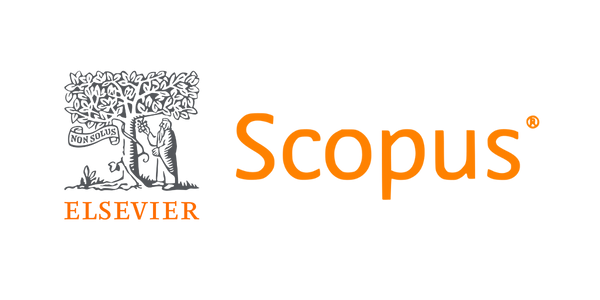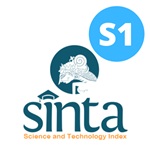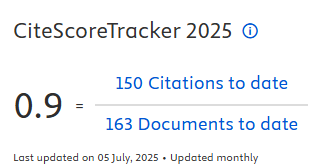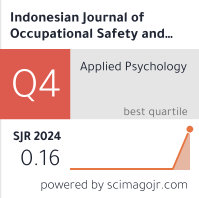ANALISIS HUBUNGAN STATUS GIZI DAN IKLIM KERJA DENGAN KELELAHAN KERJA DI CATERING HIKMAH FOOD SURABAYA
Downloads
ABSTRACT
Work fatigue is condition which some factors have interaction with the workers. Fatigue may occur in the workforce by various factors, such as nutritional status and work climate. This study was conducted to analyze the relationship between nutritional status and work climate with work fatigue in Hikmah Food Catering. This was an observational analytic study using a cross sectional design. Samples size 43 peoples were taken by simple random sampling method. The correlation between the dependent and independent variables were analyzed by spearman correlation test (α = 0,05). Work climate in this catering were kitchen area 29,6°C, non AC 26,5°C area, and air-conditioned area 20,3°C. Spearman correlation test results showed that there was nutritional status which had no significant association with work fatigue (p = 0,954) and there was work climate which had a significant association with work fatigue (p = 0.004). The conclusion of this research is nutritional status has no relation with fatigue, meanwhile work climate have a relation with work fatigue. There are advised for the industry such as providing sufficient drinking water supplies, and installing push pull system ventilation, especially in the kitchen area.
Keywords: worker, nutritional status,work climate, work fatigue, catering
Anizar.2009. Teknik Keselamatan dan Kesehatan
Kerja di Industri. Yogyakarta: Graha Ilmu.
Ardyanto, D.2005. Potret Iklim Kerja dan Upaya Pengendalian Lingkungan pada Perusahaan Peleburan Baja di Sidoarjo. Jurnal Kesehatan Lingkungan Vol. 1, No. 2. Surabaya: Fakultas Kesehatan Masyarakat Universitas Airlangga.
Atiqoh, J. 2014. Faktor-faktor yang Berhubungan dengan Kelelahan Kerja pada Pekerja Konveksi Bagian Penjahitan di CV. Aneka Garment Gunungpati Semarang. Skripsi. Semarang: Universitas Diponegoro.
Budiono, A.M.2003. Bunga Rampai Hiperkes dan Keselamatan Kerja: Hygiene Perusahaan, Ergonomi, Kesehatan Kerja, dan Keselamatan Kerja. Semarang: Badan Penerbit Universitas Diponegoro.
C e n t e r s f o r D i s e a s e C o n t r o l a n d P r e v e n t i o n (CDC).2011. Healthy Weight – It's not a diet, It's a Lifestyle. District of Columbia.
Dewi, M.M. 2013. Hubungan Antara Asupan Makan, Status Gizi, dan Kelelahan Kerja Terhadap Produktivitas Kerja pada Pekerja Pabrik PT. Tigaraksa Satria Tbk. Yogyakarta. Skripsi. Yogyakarta: Universitas Gajah Mada.
Irma, M.R.2014. Faktor yang Berhubungan dengan Kelelahan Kerja pada Unit Produksi Paving Block CV. Sumber Galian Kecamatan Biringkanaya Kota Makassar. Skripsi. Makassar: Universitas Hassanudin.
Kementerian Tenaga Kerja dan Transmigrasi. 2011. Peraturan Menteri Tenaga Kerja dan Transmigrasi Nomor PER.13/MEN/X/2011 Tahun
Tentang Nilai Ambang Batas Faktor Fisika dan Faktor Kimia di Tempat Kerja. Jakarta: Bidang Ketenagakerjaan dan Ketransmigrasian Kementrian Tenaga Kerja dan Transmigrasi RI.
Krisanti, R.D. 2011. Hubungan Antara Tekanan Panas dengan Kelelahan Kerja pada Tenaga Kerja Bagian Produksi di CV. Rakabu Furniture Surakarta. Skripsi. Surakarta : Universitas Sebelas Maret Surakarta.
Melati, S.2013. Hubungan Antara Usia, Masa Kerja, dan Status Gizi dengan Kelelahan Kerja pada Pekerja Mebel di CV. Mercusuar dan CV. Mariska Desa Lielem Kecamatan Sonder Kabupaten Minahasa. Skripsi. Manado: Universitas Sam Ratulangi.
Nugroho, A. 2013. Pengaruh Iklim Kerja Panas Terhadap Kelelahan Tenaga Kerja di Bagian Peleburan Logam Koperasi Batur Jaya Ceper Klaten. Artikel Publikasi Ilmiah. Surakarta: Universitas Muhammadiyah Surakarta.
Oentoro, S. 2004. Kampanye Atasi Kelelahan Mental dan Fisik. Jakarta: UI Press.
Ramayanti, R. 2015. Hubungan Status Gizi dan Beban Kerja terhadap Kelelahan Kerja (Studi pada Tenaga Kerja PT. Hikmah Sejahtera Bagian Catering Hikmah Food Surabaya). Skripsi. Surabaya: Universitas Airlangga.
Setyawati, Lientje. 2010. Selintas Tentang Kelelahan Kerja. Yogyakarta: Amara Books.
Soeripto. 2008., Hygiene Industri. Jakarta: Balai Penerbit Fakultas Kedokteran Universitas Indonesia.
Suma'mur P.K. 2009. Higiene Perusahaan dan Kesehatan Kerja. Jakarta: Sagung Seto, Supariasa, I.D.N.2002. Penilaian Status Gizi. Jakarta:
Penerbit Buku Kedokteran EGC.
Tarwaka. 2004. Ergonomi untuk Keselamatan, Kesehatan Kerja, dan Produktivitas. Surakarta: Uniba Press.
Tarwaka. 2010. Ergonomi Industri. Surakarta: Harapan Press.
Wahyuni, A. 2009. Faktor yang Berhubungan Terhadap Kelelahan CSSD Laundry Rumah Sakit di Kota Makassar. Tesis. Makassar: Universitas Hasanuddin.
World Health Organization (WHO).2000. Klasifikasi Berat Badan Berdasarkan BMI pada Penduduk Asia Dewasa.
Zamsiar, Nusye. 2015. Pedoman Kebutuhan Cairan Bagi Pekerja agar Tetap Sehat dan Produktif. Jakarta: PERDOKI

In order to be accepted and published by The Indonesian Journal of Occupational Safety and Health, Author(s) who submit an article should complete all the review process. The copyright of received articles assigned to the The Indonesian Journal of Occupational Safety and Health and Department of Safety and Health, Universitas Airlangga as publishers of the journal. The intended copyright includes the rights to publish articles in various forms (including reprints).
The Editorial Team of The Indonesian Journal Of Occupational Safety and Health and Department of Safety and Health strive to ensure that no errors occur in the articles that have been published, both data errors and statements in the article.
Users of this website will be licensed to use materials from this website following the Creative Commons Attribution-NonCommercial-ShareAlike 4.0 International License. No fees charged. Please use the materials accordingly.
------------------------------------------------------------------------------------------------------------------------------------------------------------------------------------------
Attribution ” You must give appropriate credit, provide a link to the license, and indicate if changes were made. You may do so in any reasonable manner, but not in any way that suggests the licensor endorses you or your use.
NonCommercial ” You may not use the material for commercial purposes.
ShareAlike ” If you remix, transform, or build upon the material, you must distribute your contributions under the same license as the original.







 How to Submit Articles in OJS
How to Submit Articles in OJS

























